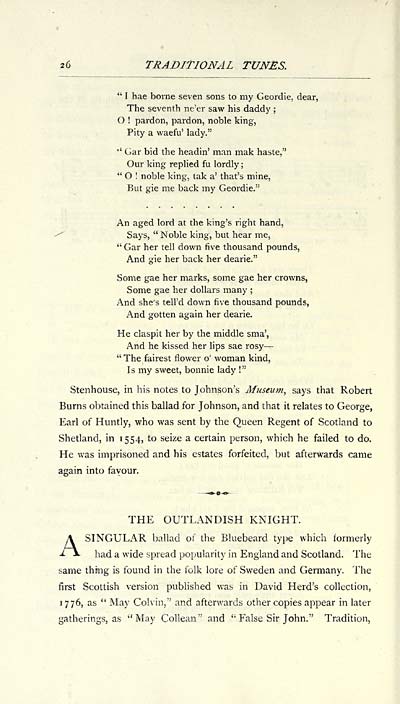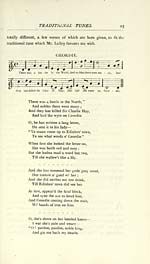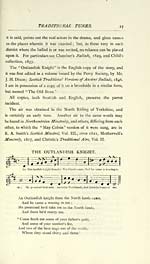Glen Collection of printed music > Printed text > Traditional tunes
(30) Page 26 - Outlandish knight
Download files
Complete book:
Individual page:
Thumbnail gallery: Grid view | List view

26 TRADITIONAL TUNES.
" I hae borne seven sons to my Geordie, dear,
The seventh ne'er saw his daddy ;
O ! pardon, pardon, noble king,
Pity a waefu' lady."
*' Gar bid the headin' man mak haste,"
Our king replied fu lordly ;
" O ! noble king, tak a' that's mine,
But gie me back my Geordie."
An aged lord at the king's right hand,
Says, " Noble king, but hear me,
" Gar her tell down five thousand pounds,
And gie her back her dearie."
Some gae her marks, some gae her crowns,
Some gae her dollars many ;
And she's tell'd down five thousand pounds,
And gotten again her dearie.
He claspit her by the middle sma',
And he kissed her lips sae rosy —
" The fairest flower o' woman kind,
Is my sweet, bonnie lady !"
Stenhouse, in his notes to Johnson's Museum, says that Robert
Burns obtained this ballad for Johnson, and that it relates to George,
Earl of Huntly, who was sent by the Queen Regent of Scotland to
Shetland, in 1554, to seize a certain person, which he failed to do.
He was imprisoned and his estates forfeited, but afterwards came
again into fayour.
THE OUTLANDISH KNIGHT.
A SINGULAR ballad of the Bluebeard type which formerly
-^ *- had a wide spread popularity in England and Scotland. The
same thing is found in the folk lore of Sweden and Germany. The
first Scottish version published was in David Herd's collection,
1776, as " May Colvin," and afterwards other copies appear in later
gatherings, as "May Collean" and " False Sir John." Tradition,
" I hae borne seven sons to my Geordie, dear,
The seventh ne'er saw his daddy ;
O ! pardon, pardon, noble king,
Pity a waefu' lady."
*' Gar bid the headin' man mak haste,"
Our king replied fu lordly ;
" O ! noble king, tak a' that's mine,
But gie me back my Geordie."
An aged lord at the king's right hand,
Says, " Noble king, but hear me,
" Gar her tell down five thousand pounds,
And gie her back her dearie."
Some gae her marks, some gae her crowns,
Some gae her dollars many ;
And she's tell'd down five thousand pounds,
And gotten again her dearie.
He claspit her by the middle sma',
And he kissed her lips sae rosy —
" The fairest flower o' woman kind,
Is my sweet, bonnie lady !"
Stenhouse, in his notes to Johnson's Museum, says that Robert
Burns obtained this ballad for Johnson, and that it relates to George,
Earl of Huntly, who was sent by the Queen Regent of Scotland to
Shetland, in 1554, to seize a certain person, which he failed to do.
He was imprisoned and his estates forfeited, but afterwards came
again into fayour.
THE OUTLANDISH KNIGHT.
A SINGULAR ballad of the Bluebeard type which formerly
-^ *- had a wide spread popularity in England and Scotland. The
same thing is found in the folk lore of Sweden and Germany. The
first Scottish version published was in David Herd's collection,
1776, as " May Colvin," and afterwards other copies appear in later
gatherings, as "May Collean" and " False Sir John." Tradition,
Set display mode to: Large image | Transcription
Images and transcriptions on this page, including medium image downloads, may be used under the Creative Commons Attribution 4.0 International Licence unless otherwise stated. ![]()
| Special collections of printed music > Glen Collection of printed music > Printed text > Traditional tunes > (30) Page 26 - Outlandish knight |
|---|
| Permanent URL | https://digital.nls.uk/87816714 |
|---|
| Description | Scottish songs and music of the 18th and early 19th centuries, including music for the Highland bagpipe. These are selected items from the collection of John Glen (1833 to 1904). Also includes a few manuscripts, some treatises, and other books on the subject. |
|---|
| Description | The Glen Collection and the Inglis Collection represent mainly 18th and 19th century Scottish music, including Scottish songs. The collections of Berlioz and Verdi collected by bibliographer Cecil Hopkinson contain contemporary and later editions of the works of the two composers Berlioz and Verdi. |
|---|

